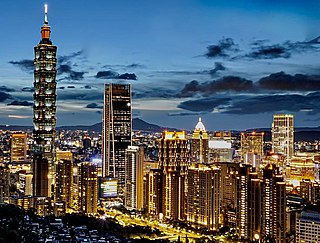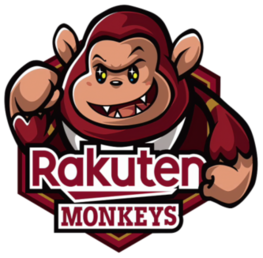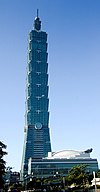Related Research Articles

The economy of Taiwan is a highly developed free-market economy. It is the seventh largest in Asia and 20th-largest in the world by purchasing power parity, allowing Taiwan to be included in the advanced economies group by the International Monetary Fund. It is gauged in the high-income economies group by the World Bank. Taiwan is the most technologically advanced computer microchip maker in the world.

Siaogang District is the southernmost district of Kaohsiung City in southern Taiwan. The second largest airport in Taiwan, Kaohsiung International Airport, is located here.

Bank of Shanghai Co., Ltd. (BOSC) is an urban commercial bank based in Shanghai in China. The bank was ranked 73rd among 1000 banks around the world by The Banker in terms of their Tier 1 capital in 2020.

The Ministry of Finance is the ministry of the Republic of China (Taiwan) responsible for government revenue, taxation, treasury, government land properties, customs in Taiwan. The current minister is Su Jain-rong.

The Taiwan Miracle or Taiwan Economic Miracle refers to the rapid industrialization and economic growth of Taiwan during the latter half of the twentieth century. As it developed alongside Singapore, South Korea and Hong Kong, Taiwan became known as one of the "Four Asian Tigers".

The Port of Kaohsiung is the largest harbor in Taiwan, handling approximately 10.26 million twenty-foot equivalent units (TEU) worth of cargo in 2015. The port is located in southern Taiwan, adjacent to Kaohsiung City, and surrounded by the city districts of Gushan, Yancheng, Lingya, Cianjhen, Siaogang, as well as Cijin. It is operated by Taiwan International Ports Corporation, Taiwan's state-owned harbor management company.

The Rakuten Monkeys, formerly First Financial Holdings Agan, La New Bears and then the Lamigo Monkeys, are a professional baseball team in the Chinese Professional Baseball League (CPBL) in Taiwan. Owned and administered by the Kaohsiung-based shoe-producing La New Corporation and then the Japan-based electronic commerce and online retailing company Rakuten, the Monkeys qualified for the playoffs in 2006 for the first time in team history, and by finishing with the best record for the whole season, gained an automatic berth in the Taiwan Series.
The Taiwan Major League Professional Baseball was a professional baseball league in Taiwan that operated from 1996 to 2003. It was established by TV tycoon Chiu Fu-sheng after a row over the Chinese Professional Baseball League (CPBL) broadcasting rights. The CPBL absorbed the TML in 2003.
CSBC Corporation, Taiwan is a company that produces ships for civilian and military use in Taiwan. It is headquartered in Kaohsiung, with shipyards in Kaohsiung and Keelung. It was a state-owned enterprise before privatization via an IPO in 2008.

CPC Corporation is a state-owned petroleum, natural gas, and gasoline company in Taiwan and is the core of the Taiwanese petrochemicals industry.
The Ten Major Construction Projects were the national infrastructure projects during the 1970s in Taiwan. The government of Republic of China believed that the country lacked key utilities such as highways, seaports, airports and power plants. Moreover, Taiwan was experiencing significant effects from the 1973 oil crisis. Therefore, to upgrade the industry and the development of the country, the government planned to take on ten massive building projects. They were proposed by the Premier Chiang Ching-kuo, beginning in 1974, with a planned completion by 1979. There were six transportation projects, three industrial projects, and one power-plant construction project, which ultimately cost over NT$300 billion in total.
Articles related to Taiwan include:

The Ministry of Economic Affairs is the ministry of the Republic of China (Taiwan) responsible for formulating policy and laws for industry and trade, foreign direct investment, energy, minerals, measurement standards, intellectual property, state-owned enterprises. The ministry is a cabinet level government agency of the Executive Yuan.
Taiwan Financial Holdings Co., Ltd. is a Taiwan based state-owned corporation that is the parent holding company of the Bank of Taiwan, BankTaiwan Securities and BankTaiwan Life Insurance.
Events from the year 2007 in Taiwan, Republic of China. This year is numbered Minguo 96 according to the official Republic of China calendar.

Mining has been practiced in Taiwan for hundreds of years. Sulfur was an early important resource collected on the island. Coal mining expanded in the 19th century to keep up with demand from increased foreign trade. Heavy industry was further expanded under Japanese rule, but air raids towards the end of World War II decimated mining infrastructure, falling below 19th century production levels. Copper mining expanded in the mid-20th century, but ended in the 1980s following a global collapse in the price of copper.

On 31 July 2014, a series of gas explosions occurred in the Cianjhen and Lingya districts of Kaohsiung, Taiwan, following reports of gas leaks earlier that night. Thirty-two people were killed and 321 people were injured.
This is a list of state-owned enterprises of China. A state-owned enterprise is a legal entity that undertakes commercial activities on behalf of an owner government. Their legal status varies from being a part of government to stock companies with a state as a regular or dominant stockholder. There is no standard definition of a government-owned corporation (GOC) or state-owned enterprise (SOE), although the two terms are often used interchangeably. The defining characteristics are that they have a distinct legal shape and they are established to operate in commercial affairs. While they may also have public policy objectives, SOEs should be differentiated from other forms of government agencies or state entities that are established to pursue purely non-financial objectives. The role of the Chinese Communist Party (CCP) in SOEs has varied at different periods but has increased during the rule of CCP General Secretary Xi Jinping, with the Party formally taking a commanding role in all SOEs as of 2020. For example, Lai Xiaomin, the former president of China Huarong Asset Management, which is a famous state-owned enterprise, announced in 2015 that during the operation of China Huarong Asset Management, the Committee of China Communist Party will play a central role, and party members will play an exemplary role.
References
- ↑ "Taiwan - 7-State-Owned Enterprises". export.gov. 21 July 2017. Retrieved 20 June 2018.
